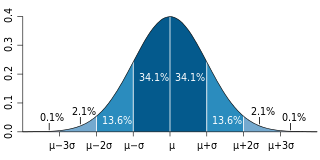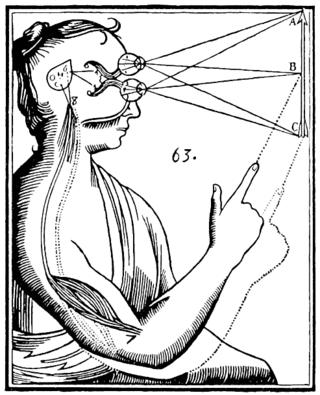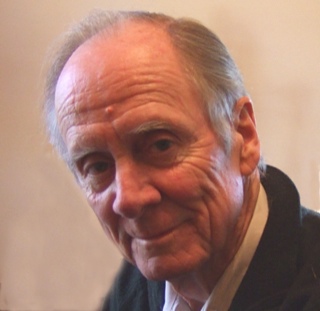Related Research Articles
Epiphenomenalism is a position on the mind–body problem which holds that subjective mental events are completely dependent for their existence on corresponding physical and biochemical events within the human body, yet themselves have no influence over physical events. According to epiphenomenalism, the appearance that subjective mental states influence physical events is an illusion, consciousness being a by-product of physical states of the world. For instance, fear seems to make the heart beat faster, but according to epiphenomenalism the biochemical secretions of the brain and nervous system —not the experience of fear—is what raises the heartbeat. Because mental events are a kind of overflow that cannot cause anything physical, yet have non-physical properties, epiphenomenalism is viewed as a form of property dualism.
Internalism and externalism are two opposite ways of integration of explaining various subjects in several areas of philosophy. These include human motivation, knowledge, justification, meaning, and truth. The distinction arises in many areas of debate with similar but distinct meanings. Internal–external distinction is a distinction used in philosophy to divide an ontology into two parts: an internal part concerning observation related to philosophy, and an external part concerning question related to philosophy.
A mental event is any event that happens within the mind of a conscious individual. Examples include thoughts, feelings, decisions, dreams, and realizations. These events often make up the conscious life that are associated with cognitive function.

In their most common sense, the terms thought and thinking refer to conscious cognitive processes that can happen independently of sensory stimulation. Their most paradigmatic forms are judging, reasoning, concept formation, problem solving, and deliberation. But other mental processes, like considering an idea, memory, or imagination, are also often included. These processes can happen internally independent of the sensory organs, unlike perception. But when understood in the widest sense, any mental event may be understood as a form of thinking, including perception and unconscious mental processes. In a slightly different sense, the term thought refers not to the mental processes themselves but to mental states or systems of ideas brought about by these processes.

Free will is the capacity or ability to choose between different possible courses of action.

Determinism is the philosophical view that all events in the universe, including human decisions and actions, are causally inevitable. Deterministic theories throughout the history of philosophy have developed from diverse and sometimes overlapping motives and considerations. Like eternalism, determinism focuses on particular events rather than the future as a concept. The opposite of determinism is indeterminism, or the view that events are not deterministically caused but rather occur due to chance. Determinism is often contrasted with free will, although some philosophers claim that the two are compatible.
Action theory is an area in philosophy concerned with theories about the processes causing willful human bodily movements of a more or less complex kind. This area of thought involves epistemology, ethics, metaphysics, jurisprudence, and philosophy of mind, and has attracted the strong interest of philosophers ever since Aristotle's Nicomachean Ethics. With the advent of psychology and later neuroscience, many theories of action are now subject to empirical testing.

In the philosophy of mind, mind–body dualism denotes either the view that mental phenomena are non-physical, or that the mind and body are distinct and separable. Thus, it encompasses a set of views about the relationship between mind and matter, as well as between subject and object, and is contrasted with other positions, such as physicalism and enactivism, in the mind–body problem.

Donald Herbert Davidson was an American philosopher. He served as Slusser Professor of Philosophy at the University of California, Berkeley, from 1981 to 2003 after having also held teaching appointments at Stanford University, Rockefeller University, Princeton University, and the University of Chicago. Davidson was known for his charismatic personality and the depth and difficulty of his thought. His work exerted considerable influence in many areas of philosophy from the 1960s onward, particularly in philosophy of mind, philosophy of language, and action theory. While Davidson was an analytic philosopher, and most of his influence lies in that tradition, his work has attracted attention in continental philosophy as well, particularly in literary theory and related areas.
In philosophy, an action is an event that an agent performs for a purpose, that is, guided by the person's intention. The first question in the philosophy of action is to determine how actions differ from other forms of behavior, like involuntary reflexes. According to Ludwig Wittgenstein, it involves discovering "[w]hat is left over if I subtract the fact that my arm goes up from the fact that I raise my arm". There is broad agreement that the answer to this question has to do with the agent's intentions. So driving a car is an action since the agent intends to do so, but sneezing is a mere behavior since it happens independent of the agent's intention. The dominant theory of the relation between the intention and the behavior is causalism: driving the car is an action because it is caused by the agent's intention to do so. On this view, actions are distinguished from other events by their causal history. Causalist theories include Donald Davidson's account, which defines actions as bodily movements caused by intentions in the right way, and volitionalist theories, according to which volitions form a core aspect of actions. Non-causalist theories, on the other hand, often see intentions not as the action's cause but as a constituent of it.

Hard determinism is a view on free will which holds that determinism is true, that it is incompatible with free will, and therefore that free will does not exist. Although hard determinism generally refers to nomological determinism, it can also be a position taken with respect to other forms of determinism that necessitate the future in its entirety.
A mental state, or a mental property, is a state of mind of a person. Mental states comprise a diverse class, including perception, pain/pleasure experience, belief, desire, intention, emotion, and memory. There is controversy concerning the exact definition of the term. According to epistemic approaches, the essential mark of mental states is that their subject has privileged epistemic access while others can only infer their existence from outward signs. Consciousness-based approaches hold that all mental states are either conscious themselves or stand in the right relation to conscious states. Intentionality-based approaches, on the other hand, see the power of minds to refer to objects and represent the world as the mark of the mental. According to functionalist approaches, mental states are defined in terms of their role in the causal network independent of their intrinsic properties. Some philosophers deny all the aforementioned approaches by holding that the term "mental" refers to a cluster of loosely related ideas without an underlying unifying feature shared by all. Various overlapping classifications of mental states have been proposed. Important distinctions group mental phenomena together according to whether they are sensory, propositional, intentional, conscious or occurrent. Sensory states involve sense impressions like visual perceptions or bodily pains. Propositional attitudes, like beliefs and desires, are relations a subject has to a proposition. The characteristic of intentional states is that they refer to or are about objects or states of affairs. Conscious states are part of the phenomenal experience while occurrent states are causally efficacious within the owner's mind, with or without consciousness. An influential classification of mental states is due to Franz Brentano, who argues that there are only three basic kinds: presentations, judgments, and phenomena of love and hate.

Property dualism describes a category of positions in the philosophy of mind which hold that, although the world is composed of just one kind of substance—the physical kind—there exist two distinct kinds of properties: physical properties and mental properties. In other words, it is the view that at least some non-physical, mental properties exist in, or naturally supervene upon, certain physical substances.

Frederick Irwin "Fred" Dretske was an American philosopher noted for his contributions to epistemology and the philosophy of mind.
Anomalous monism is a philosophical thesis about the mind–body relationship. It was first proposed by Donald Davidson in his 1970 paper "Mental Events". The theory is twofold and states that mental events are identical with physical events, and that the mental is anomalous, i.e. under their mental descriptions, relationships between these mental events are not describable by strict physical laws. Hence, Davidson proposes an identity theory of mind without the reductive bridge laws associated with the type-identity theory. Since the publication of his paper, Davidson refined his thesis and both critics and supporters of anomalous monism have come up with their own characterizations of the thesis, many of which appear to differ from Davidson's.
The problem of mental causation is a conceptual issue in the philosophy of mind. That problem, in short, is how to account for the common-sense idea that intentional thoughts or intentional mental states are causes of intentional actions. The problem divides into several distinct sub-problems, including the problem of causal exclusion, the problem of anomalism, and the problem of externalism. However, the sub-problem which has attracted most attention in the philosophical literature is arguably the exclusion problem.
The Philosophy of mind is a branch of philosophy that deals with the nature of the mind and its relation to the body and the external world.

The mind–body problem is a philosophical problem concerning the relationship between thought and consciousness in the human mind, and the body.
An intention is a mental state in which the agent commits themselves to a course of action. Having the plan to visit the zoo tomorrow is an example of an intention. The action plan is the content of the intention while the commitment is the attitude towards this content. Other mental states can have action plans as their content, as when one admires a plan, but differ from intentions since they do not involve a practical commitment to realizing this plan. Successful intentions bring about the intended course of action while unsuccessful intentions fail to do so. Intentions, like many other mental states, have intentionality: they represent possible states of affairs.
Humeanism refers to the philosophy of David Hume and to the tradition of thought inspired by him. Hume was an influential Scottish philosopher well known for his empirical approach, which he applied to various fields in philosophy. In the philosophy of science, he is notable for developing the regularity theory of causation, which in its strongest form states that causation is nothing but constant conjunction of certain types of events without any underlying forces responsible for this regularity of conjunction. This is closely connected to his metaphysical thesis that there are no necessary connections between distinct entities. The Humean theory of action defines actions as bodily behavior caused by mental states and processes without the need to refer to an agent responsible for this. The slogan of Hume's theory of practical reason is that "reason is...the slave of the passions". It restricts the sphere of practical reason to instrumental rationality concerning which means to employ to achieve a given end. But it denies reason a direct role regarding which ends to follow. Central to Hume's position in metaethics is the is-ought distinction. It states that is-statements, which concern facts about the natural world, do not imply ought-statements, which are moral or evaluative claims about what should be done or what has value. In philosophy of mind, Hume is well known for his development of the bundle theory of the self. It states that the self is to be understood as a bundle of mental states and not as a substance acting as the bearer of these states, as is the traditional conception. Many of these positions were initially motivated by Hume's empirical outlook. It emphasizes the need to ground one's theories in experience and faults opposing theories for failing to do so. But many philosophers within the Humean tradition have gone beyond these methodological restrictions and have drawn various metaphysical conclusions from Hume's ideas.
References
- ↑ Malpas, Jeff (2021), "Donald Davidson", in Zalta, Edward N. (ed.), The Stanford Encyclopedia of Philosophy (Fall 2021 ed.), Metaphysics Research Lab, Stanford University, retrieved 2023-01-28
- ↑ Davidson, Donald (1963). "Actions, Reasons, and Causes". Journal of Philosophy. 60 (23): 685–700. doi:10.2307/2023177. JSTOR 2023177.
- Frankfurt, Harry. 1988. "The Problem of Action", in The Importance of What We Care About. Cambridge: Cambridge UP.
- Mele, Alfred. 1997. "Introduction", in Philosophy of Action. Oxford: Oxford UP.